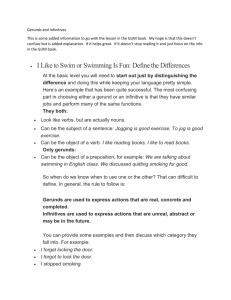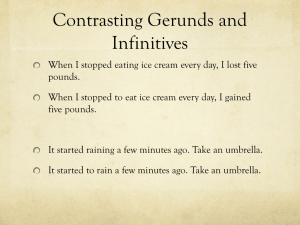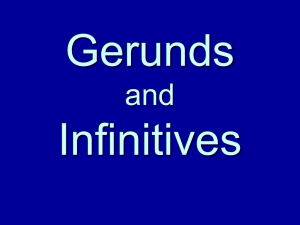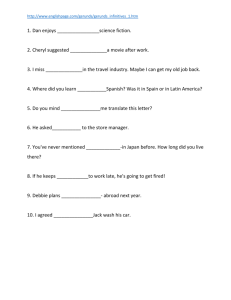07&08Infinitives&Gerunds
advertisement
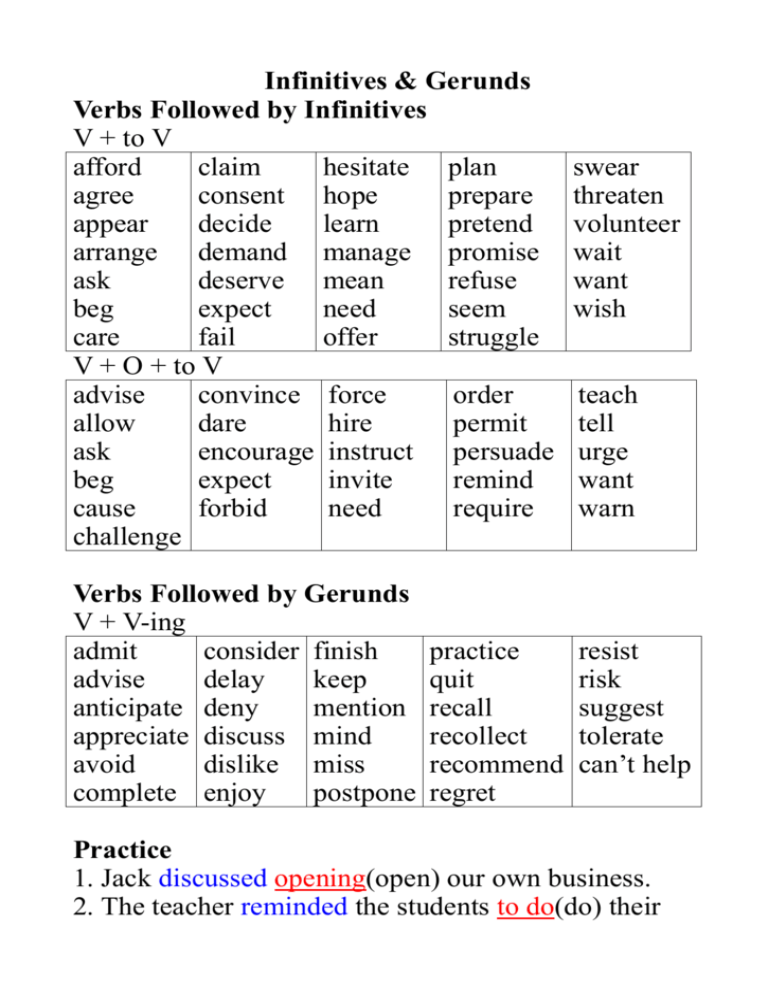
Infinitives & Gerunds Verbs Followed by Infinitives V + to V afford claim hesitate plan agree consent hope prepare appear decide learn pretend arrange demand manage promise ask deserve mean refuse beg expect need seem care fail offer struggle V + O + to V advise convince force order allow dare hire permit ask encourage instruct persuade beg expect invite remind cause forbid need require challenge Verbs Followed by Gerunds V + V-ing admit consider finish advise delay keep anticipate deny mention appreciate discuss mind avoid dislike miss complete enjoy postpone practice quit recall recollect recommend regret swear threaten volunteer wait want wish teach tell urge want warn resist risk suggest tolerate can’t help Practice 1. Jack discussed opening(open) our own business. 2. The teacher reminded the students to do(do) their assignments. 3. I was broke, so Jenny offered to lend(lend) me some money. 4. He told a really funny joke. We couldn’t stop laughing(laugh). 5. Tony mentioned taking(take) the bus to school instead of walking. 6. My boss expects me to finish(finish) this work ASAP. 7. I wanted to go to Japan. Sally suggested going(go) to Hawaii. 8. You have to decide how to do it. You can’t postpone making(make) that decision much longer. 9. Lucy pretended to know(know) the answer to my question. 10. Jack advised me to find(find) a new apartment. 11. Joan and David were considering getting(get) married in June, but they finally decided to wait(wait) until August. 12. Even though I asked the people in front of me at the movie to be(be) quiet, they kept talking(talk). 13. I don’t mind waiting(wait) for you. Go ahead and finish doing(do) your work. 14. The taxi driver refused to take(take) a check. He wanted the passenger to pay(pay) in cash. 15. Sometimes students avoid looking(look) at the teacher if they don’t want to answer(answer) a question. Verbs Followed by Infinitives/Gerunds V + to V/V-ing (same meaning) begin start continue like love prefer hate can’t stand/bear I prefer staying home to going to the concert. I prefer to stay home than (to) go to the concert. Verbs Followed by Infinitives/Gerunds V + toV/ V-ing (different meanings) Judy always remembers to lock the door. I remember seeing the Alps for the first time. Sam often forgets to lock the door. I’ll never forget seeing the Alps for the first time. I regret to tell you that you failed the test. I regret lending him some money. He never paid me back. I’m trying to study hard. The room was hot. I tried opening the window, but that didn’t help. So I tried turning on the fan, but I was still hot. Finally, I turned on the air conditioner. She stopped to take a rest when she got tired. She stopped going to classes when she got sick. Practice 1. The play wasn’t very good. The audience started to leave/leaving(leave) before it was over. 2. The children love to swim/swimming(swim) in the ocean. 3. When I travel, I prefer driving(drive) to taking(take) a plane. 4. I prefer to drive(drive) than (to) take(take) a plane. 5. I always remember to turn(turn) off all the lights before I leave my house. 6. I remember playing(play) with dolls when I was a child. 7. What did you forget to do(do) before you left for class this morning. 8. I can’t ever forget watching(watch) our team score the winning goal in the last seconds of the game. 9. I regret to inform(inform) you that your loan application has not been approved. 10. I regret not listening(listen, not) to my father’s advice. He was right. 11. When a student asks a question, the teacher always tries to explain(explain) it as clearly as possible. 12. I tried everything, but the baby still wouldn’t stop crying(cry). I tried holding(hold) him. I tried feeding(feed) him. I tried changing(change) his diapers. Nothing worked. 13. My grandfather prefers to read/reading(read). 14. I forgot to take(take) a book back to the library, so I had to pay a fine. 15. After studying for three hours, I stopped to get (get) something to eat. Adjectives Followed by Infinitives be adj + to V glad sorry anxious happy sad eager pleased upset willing delight disappointed motivated afraid surprised amazed astonished content relieved lucky fortunate proud ashamed ready prepared determined careful hesitant reluctant shocked stunned Practice 1. I was relieved to find(find) out that I had passed the exam. 2. The soldier were prepared to fight(fight). 3. The children are anxious to go(go) to the circus. 4. The teacher is always willing to help(help) us. 5. Be careful not to slip(slip, not) on the icy sidewalks. 6. Tom was hesitant to walk(walk) home alone on the dark streets. 7. We were sorry to hear(hear) the bad news. 8. At first, the bank was reluctant to lend(lend) me the money. 9. Visitors are often amazed to discover(discover) how little the town has changed. 10. The students are motivated to study(study) English. Using Infinitive with Too & Enough 1. A child is too young to read(read) a long novel, but an adult is old enough to appreciate(appreciate) good literature. 2. She is too weak to lift(lift) the heavy box, but her husband is strong enough to lift(lift) it. 3. It’s too hot for us to play(play) outdoors, but it’s hot enough for us to go(go) swimming. 4. I was too tired to walk any farther. =I was so tired that I couldn’t walk any farther. 5. She is so young as to look like a child. =She is so young that she looks like a child. Past & Passive Forms 1. I didn’t expect to be invited to his party. I appreciated being invited to your home. 2. The rain seems to have stopped at six. I appreciate having had the opportunity to meet the king in 1985. 3. Jane is fortunate to have been given a scholarship last year. I appreciate having been told the news yesterday. Practice 1. It is easy to be fooled(fool) by his lies. 2. I don’t enjoy being laughed(laugh) at by others. 3. Tim was in the army during the war. He was caught by the enemy but he managed to escape(escape). He is lucky to have escaped(escape) with his life. 4. I’m glad that my company sent me to another country to study. I’m very pleased to have been given(give) the opportunity to learn about another culture. 5. Last year I studied abroad. I appreciate having had(had) the opportunity to live and study in a foreign country. 6. Ms. Walters complained about not having been told(tell, not) about the meeting. In the future, she expects to be informed(inform) of any and all meetings. 7. A: I thought Sam was sick. B: So did I. But he seems to have recovered(recover) very quickly. He certainly doesn’t seem to be(be) sick now. Using Need 1. I need to borrow some money. 2. John needs to be told the truth. 3. The house needs painting/to be painted. Using Verbs of Perception see watch observe hear smell notice look at feel listen to I heard a famous star sing at the concert last night. When I walked into the apartment, I heard my roommate singing in the shower. The cat watched the bird fly away. (The bird disappeared) The cat hungrily watched the bird flying above its head. (The bird continued to fly hear the cat.) Using Let & Help 1. My father let me drive his car. 2. I let my friend borrow my bicycle. 3. My brother helped me wash/to wash my car. Using Causative Verbs 1. Mrs. Lee made her son clean his room. Sad movies make me cry. 2. I had the plumber repair the leak. I had my watch repaired. 3. The students got the teacher to dismiss class early. I got my bicycle fixed. Practice 1. The chair is broken. I need to fix(fix) it. The chair needs fixing/to be fixed(fix). 2. When I walked past the park, I saw some children playing(play) in the park. 3. I remember it distinctly. At five yesterday afternoon, I saw Jim walk(walk) to his car, open (open) the door, and get(get) in. 4. Do you see Mary walking(walk) up the street? Isn’t that her, the woman in the red dress? 5. Mrs. Crane had her house painted(paint). 6. Don got some kids in the neighborhood to clean (clean) out his garbage. 7. Mr. Brown made her son wash(wash) the windows. 8. I went to the bank to have a check cashed(cash). 9. I spilled some tomato sauce on my coat. Now I need to get my coat cleaned(clean). 10. Do you smell something burning(burn)? 11. When I heard the principal of the school call(call) my name at the graduation ceremony, I walked to the front of the auditorium to receive my diploma. 12. Do you hear someone calling(call) for help in the distance? I do. Special Expressions + V 1. I cannot but think(think) so. =I cannot choose/help but think(think) so. =I cannot help thinking(think) so. 2. Helen did nothing but/except study(study) all day long. 3. All you have to do is take(take) a rest. What we can do now is wait(wait). Go + V-ing go boating go bowling go camping go canoeing go dancing go fishing go hiking go jogging go running go sailing go skating go skiing go shopping go swimming go sightseeing go birdwatching go mountain climbing go window shopping Special Expressions + V-ing 1. We had a lot of fun playing(play) games at the picnic. 2. We had a good time swimming(swim) in the ocean. 3. I have trouble/difficulty understanding(understand) Helen when she speaks. She talks too fast. 4. Ted is an indecisive person. He has a hard/difficult time making(make) up his mind about anything. 5. Heather is a commuter. Every work day, she spends almost three hours going(go) to and from work. 6. We wasted our money going(go) to that movie. It was very boring. 7. Michael is sitting in class taking(take) notes. 8. Martha is standing at the corner waiting(wait) for the bus. 9. It was a beautiful spring day. Dorothy was lying under a tree listening(listen) to the birds sing. 10. I wondered what the children were doing while I was gone. When I got home, I found them watching(watch) TV. 11. When Mr. Brown walked into the kitchen, he caught the children eating(eat) some candy. 12. All the students are busy preparing(prepare) for the coming entrance exam. 13. There is no telling(tell) what may happen. 14. What do you say to playing(play) volleyball? 15. It’s no use crying(cry) over spilt milk. 16. This museum is worth visiting(visit). 17. This museum is worthy of being visited(visit).
